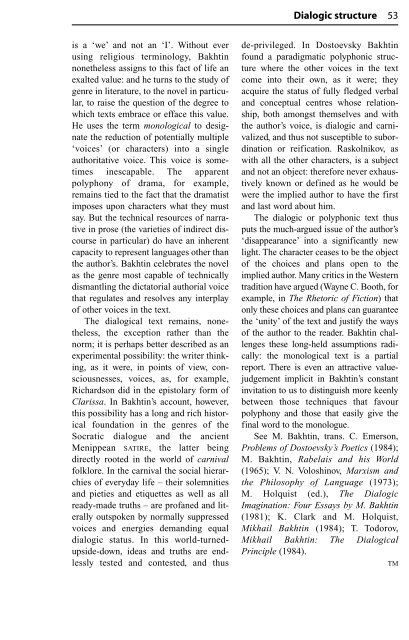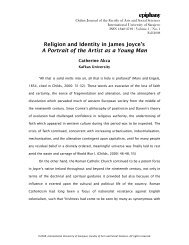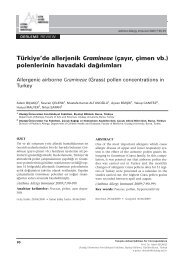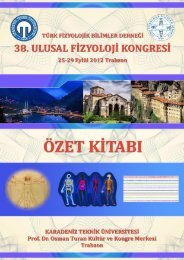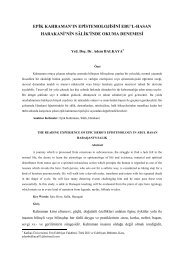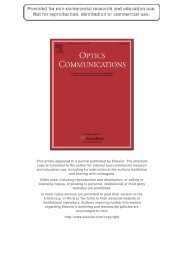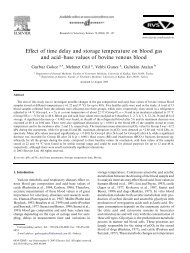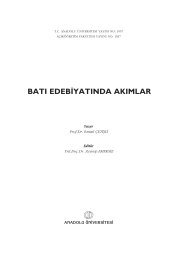The Routledge Dictionary of Literary Terms
The Routledge Dictionary of Literary Terms
The Routledge Dictionary of Literary Terms
Create successful ePaper yourself
Turn your PDF publications into a flip-book with our unique Google optimized e-Paper software.
is a ‘we’ and not an ‘I’. Without ever<br />
using religious terminology, Bakhtin<br />
nonetheless assigns to this fact <strong>of</strong> life an<br />
exalted value: and he turns to the study <strong>of</strong><br />
genre in literature, to the novel in particular,<br />
to raise the question <strong>of</strong> the degree to<br />
which texts embrace or efface this value.<br />
He uses the term monological to designate<br />
the reduction <strong>of</strong> potentially multiple<br />
‘voices’ (or characters) into a single<br />
authoritative voice. This voice is sometimes<br />
inescapable. <strong>The</strong> apparent<br />
polyphony <strong>of</strong> drama, for example,<br />
remains tied to the fact that the dramatist<br />
imposes upon characters what they must<br />
say. But the technical resources <strong>of</strong> narrative<br />
in prose (the varieties <strong>of</strong> indirect discourse<br />
in particular) do have an inherent<br />
capacity to represent languages other than<br />
the author’s. Bakhtin celebrates the novel<br />
as the genre most capable <strong>of</strong> technically<br />
dismantling the dictatorial authorial voice<br />
that regulates and resolves any interplay<br />
<strong>of</strong> other voices in the text.<br />
<strong>The</strong> dialogical text remains, nonetheless,<br />
the exception rather than the<br />
norm; it is perhaps better described as an<br />
experimental possibility: the writer thinking,<br />
as it were, in points <strong>of</strong> view, consciousnesses,<br />
voices, as, for example,<br />
Richardson did in the epistolary form <strong>of</strong><br />
Clarissa. In Bakhtin’s account, however,<br />
this possibility has a long and rich historical<br />
foundation in the genres <strong>of</strong> the<br />
Socratic dialogue and the ancient<br />
Menippean SATIRE, the latter being<br />
directly rooted in the world <strong>of</strong> carnival<br />
folklore. In the carnival the social hierarchies<br />
<strong>of</strong> everyday life – their solemnities<br />
and pieties and etiquettes as well as all<br />
ready-made truths – are pr<strong>of</strong>aned and literally<br />
outspoken by normally suppressed<br />
voices and energies demanding equal<br />
dialogic status. In this world-turnedupside-down,<br />
ideas and truths are endlessly<br />
tested and contested, and thus<br />
Dialogic structure 53<br />
de-privileged. In Dostoevsky Bakhtin<br />
found a paradigmatic polyphonic structure<br />
where the other voices in the text<br />
come into their own, as it were; they<br />
acquire the status <strong>of</strong> fully fledged verbal<br />
and conceptual centres whose relationship,<br />
both amongst themselves and with<br />
the author’s voice, is dialogic and carnivalized,<br />
and thus not susceptible to subordination<br />
or reification. Raskolnikov, as<br />
with all the other characters, is a subject<br />
and not an object: therefore never exhaustively<br />
known or defined as he would be<br />
were the implied author to have the first<br />
and last word about him.<br />
<strong>The</strong> dialogic or polyphonic text thus<br />
puts the much-argued issue <strong>of</strong> the author’s<br />
‘disappearance’ into a significantly new<br />
light. <strong>The</strong> character ceases to be the object<br />
<strong>of</strong> the choices and plans open to the<br />
implied author. Many critics in the Western<br />
tradition have argued (Wayne C. Booth, for<br />
example, in <strong>The</strong> Rhetoric <strong>of</strong> Fiction) that<br />
only these choices and plans can guarantee<br />
the ‘unity’ <strong>of</strong> the text and justify the ways<br />
<strong>of</strong> the author to the reader. Bakhtin challenges<br />
these long-held assumptions radically:<br />
the monological text is a partial<br />
report. <strong>The</strong>re is even an attractive valuejudgement<br />
implicit in Bakhtin’s constant<br />
invitation to us to distinguish more keenly<br />
between those techniques that favour<br />
polyphony and those that easily give the<br />
final word to the monologue.<br />
See M. Bakhtin, trans. C. Emerson,<br />
Problems <strong>of</strong> Dostoevsky’s Poetics (1984);<br />
M. Bakhtin, Rabelais and his World<br />
(1965); V. N. Voloshinov, Marxism and<br />
the Philosophy <strong>of</strong> Language (1973);<br />
M. Holquist (ed.), <strong>The</strong> Dialogic<br />
Imagination: Four Essays by M. Bakhtin<br />
(1981); K. Clark and M. Holquist,<br />
Mikhail Bakhtin (1984); T. Todorov,<br />
Mikhail Bakhtin: <strong>The</strong> Dialogical<br />
Principle (1984).<br />
TM


